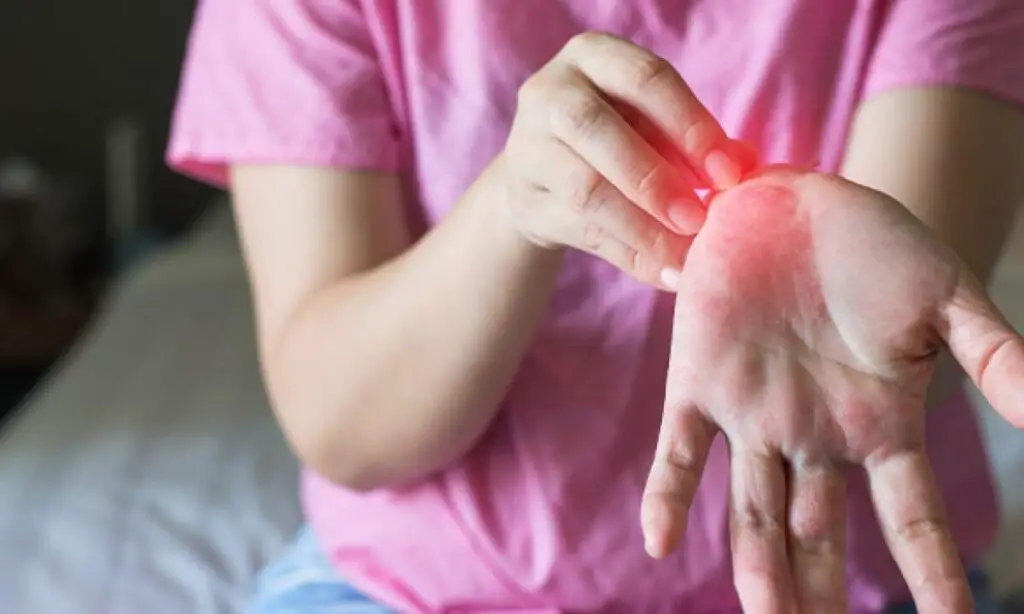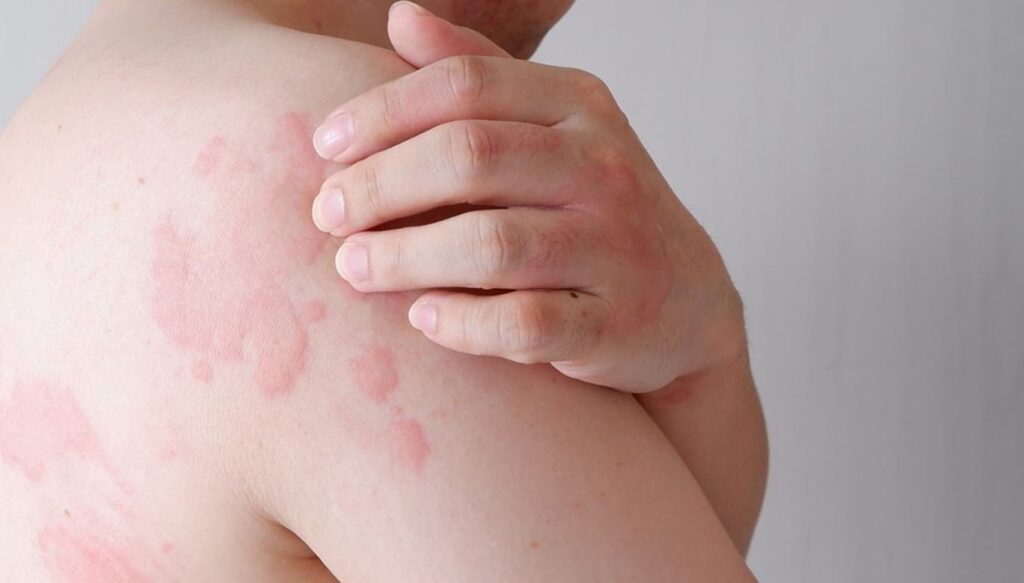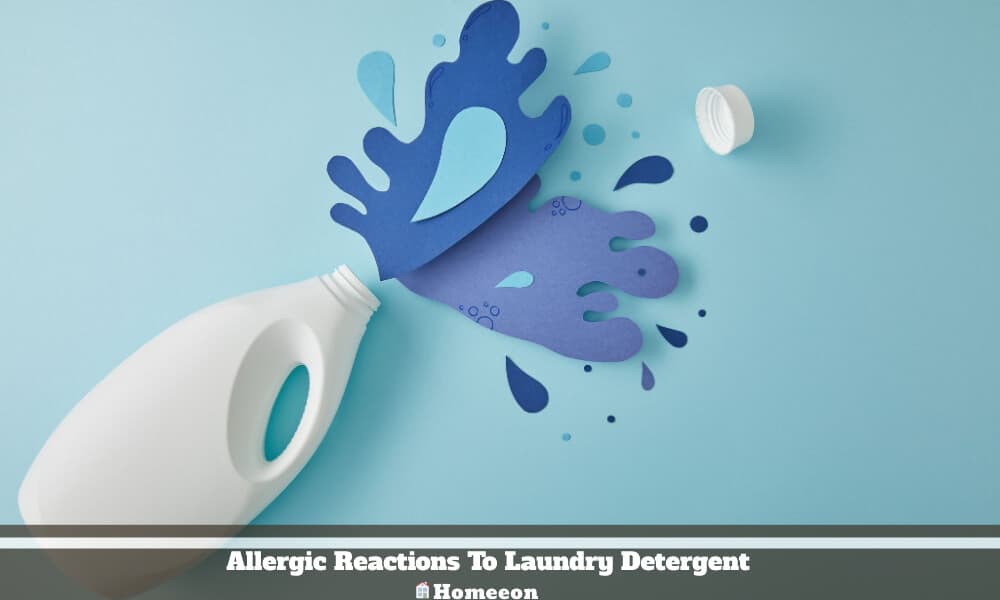Last Updated on August 10, 2023 By Emma W. Thomas
Allergic reactions to laundry detergent can last from a few hours to up to two weeks. Symptoms may include skin irritation, rash, itching, or respiratory issues. If symptoms persist or worsen, consult a healthcare professional for proper diagnosis and treatment.
How Long Allergic Reactions To Laundry Detergent Last?
Individuals who exhibit an allergic reaction to laundry detergent might wonder how long such discomfort might endure. Various factors, including the severity of the allergic response, dictate the duration of such maladies. Below, is a listicle explaining how long allergic reactions to laundry detergent can last:
1. Immediate Reaction: Duration of a Few Hours to a Day
Those who experience an immediate or acute allergic response might observe symptoms like redness and itchiness almost immediately after exposure. These symptoms are typically seen to dissipate within a few hours to a day, provided there is no additional contact with the offending detergent.
2. Delayed Reaction: Duration of 24 to 48 Hours
In some people, an allergic reaction may not occur immediately after exposure. Instead, symptoms such as skin rash or hives may appear 24-48 hours later. This situation is known as a delayed type hypersensitivity reaction.
3. Persistent Contact Dermatitis: Weeks to Months
Persistent contact dermatitis due to soap or detergent allergy can last for weeks to even months. This usually happens when the individual remains in contact with the allergen. Hence, switching to hypoallergenic detergents or those made for sensitive skin should be considered.
4. Sensitization: Duration Unknown
Once an individual becomes sensitized to a specific detergent, even the slightest contact can trigger an allergic reaction. In sensitized individuals, the duration of the allergic reaction can vary greatly and may depend on their personal immune response.
5. Long-term Allergic Dermatitis: Several Months
In severe cases, the allergic reactions can evolve into allergic contact dermatitis. The condition is characterized by an itchy, red rash that can last for several months. The best way to manage this is by identifying and avoiding the laundry detergent causing the allergy.
| Type of Reaction | Duration |
|---|---|
| Immediate Reaction | Few hours to 1 day |
| Delayed Reaction | 24 to 48 hours |
| Persistent Contact Dermatitis | Weeks to Months |
| Sensitization | Varies depending on immune response |
| Long-term Allergic Dermatitis | Several months |
Type Of Allergens And The Period It Is Likely To Affect You

Most ingredients in laundry detergents are allergens in that they will cause an allergic reaction in the user. Each allergen causes a different reaction, and the period it lasts will vary. The following are the main allergens;
Fragrances
Different detergents have varying perfumes meant to improve their smell. These fragrances are made from a combination of chemicals that can react differently to your skin. Depending on the individual and the type of allergen, one can have watery eyes, get a running nose, cough, whizzing, or develop a skin rash. Sneezing and coughing may last for a few minutes or hours, while skin rash and running nose can last for up to two weeks.
Surfactants
Surfactants are chemical agents that surround dirt particles on your fabric. The agents then dissolve the dirt, making it easy to wash with water. Surfactants are made of various chemicals that include nonylphenol ethoxylate and quaternion-15, both of which are skin irritants. Allergic reactions from these substances last between two and three weeks, beyond which you need to seek medical attention.
Stabilizers
Stabilizers help to prolong the useful life of a detergent by keeping its formula intact. Some of these ingredients, like polyalkenes and olefin compounds, may cause allergic reactions in the users. Allergic reactions from stabilizers may last for up to two weeks before fading away. But, it is advisable to consult a doctor immediately after you experience the condition.
Bleach
Some bleaching agents come as ingredients in laundry detergents, while others are sold separately. These substances help to whiten white clothes and brighten bright ones. You may get irritation in your eyes, lungs, and skin.
Allergic reactions from bleaching agents may last from one week to several months. It is advisable to seek medication immediately if you get this irritation to shorten the period it lasts.
Contact Dermatitis
Contact dermatitis is a skin condition that can either be an allergen or not. There are two types of this condition, i.e. irritant and allergic contact dermatitis. The type you get depends on what your skin comes into contact with;
Irritant Contact Dermatitis
You can get this condition when your skin is in contact with an irritant you are not allergic to. Your skin’s top layer gets irritated, resulting in rashes immediately or upon consequent exposure. An immediate irritation may last from a few weeks to one month, but you can sense a repeated reaction and treat it before it worsens.
This condition is the most common non-allergic reaction that affects the skin.
Allergic Contact Dermatitis
You can get this condition if your skin is allergic to laundry detergents. But, your body will develop immunity towards the allergen.
How To Prevent Allergic Reactions To Laundry Detergent
Preventing an allergic reaction before it occurs is easier than seeking to know how long it will last. Since we all love our bodies, it is important to avoid any irritation as much as we can. Below are some ways to avert allergies;
Rinse Your Clothes At Least Two Times
One of the main causes of allergic reactions is detergent deposits on your fabric due to the poor rinsing process. These deposits may contain allergens that affect you when you wear the clothes.
To prevent this problem, be sure to rinse your clothes thoroughly. You can rinse your fabric two or more times. You may also use warm water since it helps to kill the allergens.
Clean Your Washing Machine
If you share your washing machine with family members, it is necessary to clean it after using a common detergent. Doing so is important, especially if some members have an allergy to laundry detergents. The affected members may then use the equipment later with their preferred cleaning agents.
Use Detergents That Are Free Of Dyes And Fragrances
Most allergens in detergents are contained in dyes and fragrances. You can choose to use detergents without these substances, such as those with vegetable-based ingredients. Such detergents are not only unscented but also hypoallergenic and suitable for sensitive skin.
Make Your Detergent
You can also decide to make your detergents at home as this will give you the liberty to pick ingredients that are friendly to your skin. Doing this will ensure that you avoid fragrances and dyes that are the main allergens in most laundry detergents.
How To Make The Allergic Reaction Go Away Faster
Some allergic reaction symptoms such as itching, swelling, and redness will often disappear on their own within one or two weeks with no treatment. There are a few things that you can do to make these symptoms less irritating in the meantime, such as;
A Cool Compress
You can take a cold shower or a cool compress to help relax a fierce rash. Pat dry gently, then moisturize the affected area.
Soaking
Powdered oatmeal (also known as colloidal oatmeal) mixes well with water and is suitable for calming inflamed skin for some individuals. While some people may react to this mixture, it is good to try using lukewarm water. Avoid very hot water since it can dry and irritate your skin.
Avoid Contact
If you are aware of what causes allergic reactions to your skin, it is important to avoid the trigger. Doing this will help to prevent further contact with allergens which may aggravate the problems.
Avoid Tight Clothes
If you have a skin rash due to an allergy, be sure to avoid wearing tight clothes. You can put on loose garments that are breathable such as cotton fabric.
Use Anti-Itch Cream
Using over-the-counter creams such as calamine lotion or hydrocortisone may help relieve the itching. They are worth trying if you have skin rashes.
Damp Dressing
In case of severe symptoms, you can try damp dressing. To do this, look for a soft, clean piece of cotton garment such as long pants or a long-sleeved T-shirt. Soak it in cold water, then wring it out. Put on the cloth and wear something that is not too tight on top of it.
While these home remedies may work on most allergies, it is important to consult a doctor if the condition does not clear on its own.
How To Treat A Chemical Burn From Laundry Detergent

Sometimes you may get a chemical burn when using a laundry detergent. If this is the case, follow these simple steps;
- Run some cold water on the affected area for about ten minutes. If there are some dry chemicals on the skin, brush them off before flushing them with water. You can use a towel or any other appropriate object, such as a soft brush.
- Remove any jewelry or clothing that has come into contact with the chemical.
- Cover the affected area with a clean cloth or sterile gauze bandage. Ensure that you wrap the bandage loosely to prevent exerting too much pressure on the burned skin.
- If you still feel the burning sensation, flush the area again using water for several minutes.
Conclusion
Sometimes you may get allergic reactions as a result of using laundry detergents. These symptoms may last for varying lengths of time, depending on the trigger and the type of detergent you use. Mostly it will take a couple of weeks for the reaction to disappear. Some symptoms include redness, skin rash, coughing, whizzing, or sneezing.
If you know what causes the reactions, it is advisable to avoid the trigger. You may also consult a doctor if the allergy takes longer than you expect it to go away.
References:
https://www.verywellhealth.com/laundry-detergent-allergies-signs-symptoms-and-treatment-5198934
https://naomedical.com/info/how-long-does-an-allergic-reaction-to-laundry-detergent-last.html
Emma is a graduate of Domestic Science or Family and Consumer Sciences (Home Economics) from the University of Wisconsin. She has 7 years of experience Working with the strategic section of BestBuy and now writing full-time for Homeeon.
From Managing the Home, Interiors, Cleaning, and Exteriors to Gardening and everything about Making A Home Liveable – is her passion and this Homeeon is the result of this.
Emma loves decorating her home with the best stuff found online. She cares about quality over anything and writes reviews about them here in Homeeon. Get in touch with her over Pinterest.
Keep reading her blogs.

